Strategic Diversity Clusters
In the effort to advance Rutgers toward a thriving culture of diversity, equity, and inclusive academic excellence, President Jonathan Holloway announced a new Strategic Diversity Cluster Hiring initiative that reaffirms the university’s commitment to recruit and retain faculty working in four interdisciplinary areas of academic strength and emerging promise at Rutgers: Race, Racism, and Inequality; Health Equity; Advancing STEM Diversity, and Engaged Climate Action.
The ten clusters below represent the first phase of this new program and will unfold over the next three years across our four campuses in New Brunswick, Camden, and Newark. More than 50 new faculty will be hired at all ranks over the next three years and will join existing Rutgers faculty working in a broad array of departments and disciplines. Many of those new hires have already been made and are listed below. Each cluster is led by one or more faculty Cluster Champion who plays a vital role in guiding the cluster’s activity and progress.
Cluster Descriptions and Champions
New Brunswick
-
Five new cluster hires in a Social and Behavioral Sciences (SBS) cluster in Race, Racism, and Intersecting Inequalities (RRII) will build on Rutgers SBS Departments’ existing strengths in examining the impact of race and racism on economic, social, political, environmental, and health inequalities and will raise Rutgers’ national and international standing in these fields. Members of this cluster will be invited to bring their perspectives and expertise in the social and behavioral sciences together in an interdisciplinary seminar or undergraduate course in RRII. That course will form the foundation, together with a selection of other related SBS courses, for the new SBS-sponsored undergraduate certificate in RRII. In addition, cluster members will initiate the first interdisciplinary SBS RRII research consortium available to faculty, graduate students, and undergraduates to facilitate collaborations in scholarship, teaching, and outreach. The cluster will draw from seven departments and one center: Africana Studies, Anthropology, Economics, Geography, Political Science, Psychology, and Sociology from SBS, SAS; and the Eagleton Institute for Politics’ Center for American Women and Politics.
Cluster Hires:
- Paru Shah, Professor, Political Science and Eagleton, SAS, Rutgers-New Brunswick
-
Valerie Jones Taylor, Associate Professor, Psychology, SAS, Rutgers-New Brunswick
-
Kaysha Corinealdi, Associate Professor, Latino and Caribbean Studies, SAS, Rutgers-New Brunswick
-
Martin Saavedra, Associate Professor, Economics, SAS, Rutgers-New Brunswick
Cluster Champions:
Diana Sanchez, Professor, Psychology, SAS, Rutgers-New Brunswick, and Kevon Rhiney, Associate Professor of Human-Environment Geography, SAS, Rutgers-New Brunswick
Diana Sanchez
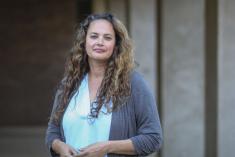
Diana T. Sanchez is a Professor in the Psychology Department and a Faculty Fellow in the Social and Behavioral Sciences Division Dean's Office. She is a diversity scientist whose research focuses on stigma, identity, intergroup bias, and close relationships. Broadly speaking, her research examines how being the target of stereotypes affects the physical, psychological, and relational health of women, racial/ethnic minorities and other minoritized groups. Dr. Sanchez has more than fifteen years of experience participating and leading diversity, equity, and inclusion (DEI) initiatives at Rutgers and in the broader scientific community. Her DEI research and service have been recognized by numerous awards, including the Faculty Leader in Diversity Award from Rutgers, the Society of Experimental Social Psychology Diversity Science Mid-Career Award, and the Distinguished Service to the Society of Personality and Social Psychology award.
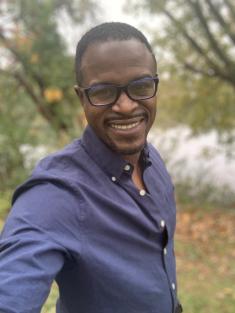
Kevon Rhiney
Kevon Rhiney (he/him/his) is an Associate Professor of Human-Environment Geography in the School of Arts and Sciences at Rutgers University-New Brunswick. His primary research examines the complex conditions under which rural agrarian landscapes change, and the socio-material implications these changes pose for smallholder livelihoods. More recent research has started to explore the biopolitical dimensions of post-hurricane reconstruction efforts across the Caribbean. Dr. Rhiney has co-edited two books and his work has been published in a number of interdisciplinary journals including the Annual Reviews, Geoforum, Proceedings of the National Academy of Sciences and World Development. He is currently the development section editor for Geography Compass, editorial board member for the Political Geography journal, and served as a contributing author for the Intergovernmental Panel on Climate Change (IPCC) Special Report on Global Warming of 1.5C.
-
The urban environment is home to billions of people around the globe, and New Jersey is among the most densely populated urban region in the United States. Urban environments are both substantial sources of global environmental pollution and discrete locations whose populations are routinely exposed to unhealthy indoor and outdoor environments. Drinking water safety, wastewater treatment, municipal solid waste disposal, exposure to legacy and emerging pollutants, and air quality are of tremendous concern to urban residents. The rapidly changing climate, sea level rise, flooding during hazardous weather events, and declining air quality exacerbate these challenges and further threaten the health of urban communities. Six new cluster hires will center on the sustainability and resilience of urban environments with additional emphasis on urban and environmental health, environmental justice, and the effects of climate change. The cluster will draw from four departments across four schools on the New Brunswick Campus: Civil and Environmental Engineering (CEE, SoE), Chemical and Biochemical Engineering (CBE, SoE), Environmental Sciences (DES, SEBS), Biochemistry and Microbiology (DBM, SEBS); and the School of Engineering (SoE), School of Environmental and Biological Sciences (SEBS), Edward J. Bloustein School of Planning and Public Policy (EJBSPP) and the Rutgers School of Social Work (RUSSW).
Cluster Hires:
JT Roane, Assistant Professor, Africana Studies and Geography, SAS, Rutgers-New Brunswick
Andrea Restrepo-Mieth, Assistant Professor, Bloustein School of Planning and Public Policy
- Diane Hildebrandt, Professor, Chemical and Biochemical Engineering, School of Engineering, Rutgers-New Brunswick
Cluster Champions:
Donna Fennell, Professor, Department of Environmental Sciences, SEBS, Rutgers-New Brunswick, and Jie Gong, Associate Professor, Department of Civil and Environmental Engineering, SOE, Rutgers-New Brunswick
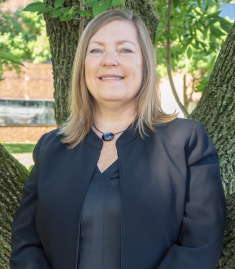
Donna E. Fennell
Donna E. Fennell is an Environmental Engineer and is a Professor and Chair of the Department of Environmental Sciences. Professor Fennell’s research focuses on microbial processes for pollutant detoxification at contaminated sites, microbial activity in the atmosphere, and biological processes for biogas production from wastes. She has published several landmark papers on organohalide-respiring bacteria with recent work focused on identifying novel microbes that are involved in dechlorination of deadly dioxin in the sediments of the highly polluted Passaic River. Her work has been funded by NSF, DoD-SERDP, NJDEP, the Hudson River Foundation and industry. She teaches water and wastewater treatment, biological unit processes and bioremediation courses. She is a fellow of the Rutgers Leadership Academy program, Changing The Future For Women In STEM at Rutgers, and the Higher Education Resource Services (HERS) Leadership Institute.
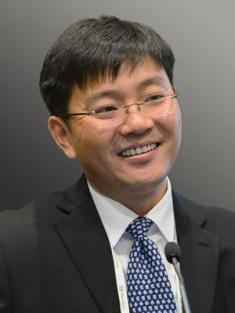
Jie Gong
Jie Gong is an Associate Professor in the Department of Civil and Environmental Engineering at Rutgers University.
His research focuses on quantifying and modeling the natural and built environments for the most vulnerable communities so that we can understand and mitigate vulnerabilities to natural and man-made extreme events as well as rapid technology and policy changes.
He conducts research on two interrelated fronts: (1) optimization and deployment of remote sensing systems for disaster response, design and development of cyberinfrastructure to support hazard analysis and modeling, and modeling of natural and manmade disaster impacts to urban communities; (2) quantifying and mitigating stressors in urban societies through simulations and smart city solutions, in particular related to mobility of disabled populations and well-being of distressed communities.
-
The Fair and Responsible Data Science cluster will establish Rutgers as a center of inquiry into the values and social context associated with data-driven decisions, real-world case studies, and the appropriate use of DS methods across diverse fields, including sciences, social sciences, technology, engineering, and business. Four senior or mid-career hires will be made in Computer Science (SAS), Electrical and Computer Engineering (SoE), Statistics (SAS), and in the School for Communication and Information.
Cluster Hires:
- Arpita Biswas, Assistant Professor, Computer Science, SAS, Rutgers-New Brunswick
- Matteo Bonvini, Assistant Professor, Statistics, SAS, Rutgers-New Brunswick
- Gemma Moran, Assistant Professor, Statistics, SAS, Rutgers-New Brunswick
Cluster Champions:
Mark Aakhus, Associate Dean for Research, and Professor of Communication, SC&I; Rong Chen, Distinguished Professor and Department Chair, Statistics, SAS; Matthew Stone, Professor and Dept Chair, Computer Science, SAS; and Wade Trappe, Professor and Associate Dean for Academic Programs and Research, Electrical and Computer Engineering, SoE
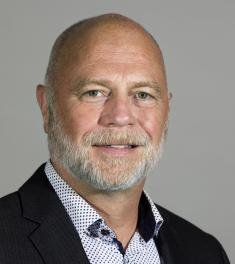
Mark Aakhus
Mark Aakhus is Associate Dean for Research and Professor of Communication, SC&I, Rutgers-New Brunswick. He investigates the relationship between communication and design, especially the uses of technological and organizational design, to augment human interaction and reasoning for decision-making and conflict management. He uses multiple methods from discourse analysis and computational social science to examine language, argumentation, and social interaction in professional practice, organizational processes, and information infrastructures.

Rong Chen
Rong Chen is a Distinguished Professor of Statistics and Chair, SAS, Rutgers-New Brunswick. A leading expert in time series analysis, forecasting, and Monte Carlo methods with applications ranging from signal processing, bioinformatics, business, and economics, he has published an acclaimed book on nonlinear time series analysis and contributed to over 100 scientific papers. He is an elected fellow of American Statistical Association and Institute of Mathematical Statistics. Rong is a former co-editor of Journal of Business & Economic Statistics and the current co-editor of Statistica Sinica and has served on the editorial board of several leading statistics and econometrics journals. He is a former program director of the National Science Foundation. He served as treasurer of the Institute of Mathematical Statistics and other various roles in professional statistical societies.
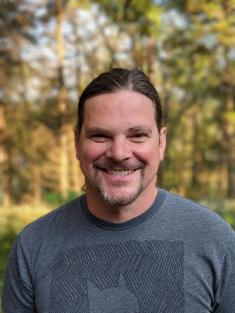
Matthew Stone
Matthew Stone is a Professor of Computer Science at SAS, Rutgers-New Brunswick and currently serves as department chair. He holds a joint appointment in the Rutgers Center for Cognitive Science. He has been at Rutgers since finishing his PhD in Computer and Information Science at the University of Pennsylvania in 1998. His research focuses on discourse, dialogue and natural language generation; he is particularly interested in leveraging models of meaning to make interactive computer systems easier to build and more human-like in their behavior. He is a co-PI on Rutgers DATA-INSPIRE TRIPODS Institute in Data Science and participated in the SAS working group launching the university’s new undergraduate Data Science programs.
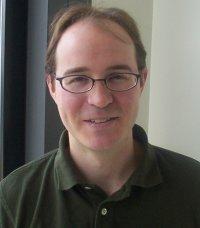
Wade Trappe
Wade Trappe is the Associate Dean of Academic Programs and Research for the School of Engineering, Rutgers-New Brunswick. He received his Ph.D. in Applied Mathematics and Scientific Computing from the University of Maryland in 2002 and is a Fellow of the IEEE, Professor in the Electrical and Computer Engineering Department at Rutgers University, and Associate Director of the Wireless Information Network Laboratory (WINLAB). He has led many federally-funded projects in cybersecurity and wireless technologies, including the development of wireless testbed resources (ORBIT testbed), and the DARPA RadioMap, SSPARC and Wireless Network Defense programs. He was the Principal Investigator for the original DARPA Spectrum Challenge. His current research examines problems at the intersection of communications and medicine, including modeling different biological systems with the goal of identifying new therapeutic strategies and applying AI/ML to personalize medical treatments.
-
The availability of safe, healthy, and affordable housing is foremost among the social determinants of health. The nation’s history of uneven metropolitan development and housing discrimination has driven deep health disparities among minority, immigrant, and low-income populations. Four new hires, three faculty, and one post-doctoral fellow in Housing and Health Equity will develop Rutgers’s multi-disciplinary approach to successfully address housing as a driver of health inequities by forging new collaborations between the School of Social Work, the School of Environmental and Biological Sciences, Edward J. Bloustein School of Planning and Public Policy (EJBSPP), and the Institute for Health at the Rutgers Biomedical and Health Sciences campus.
Cluster Hires:
- Katherine Marcal, Assistant Professor, School of Social Work, Rutgers-New Brunswick
- Veronica Jones, Assistant Professor, Family and Community Health Sciences (FCHS), NJEAS, Rutgers-New Brunswick
- Dan Treglia, Instructor, Rutgers Center for State Health Policy, Rutgers-New Brunswick
Cluster Champions:
Emmy Tiderington, Associate Professor, School of Social Work (Champion), and Joel Cantor, Distinguished Professor, Bloustein School of Planning and Public Policy and Director, Center for State Health Policy (Center/CSHP) at IFH (co-Champion)
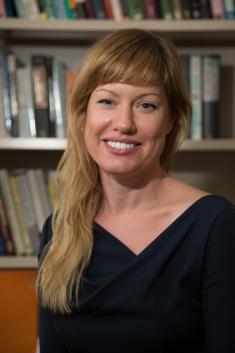
Emmy Tiderington
Emmy Tiderington is an Associate Professor in the School of Social Work and Associate Faculty at the Institute for Health, Health Care Policy, and Aging Research at Rutgers-New Brunswick. Her research focuses on recovery in homeless services, as well as the implementation and effectiveness of housing programs and support for homeless populations with complex needs. This work has been funded by Federal, State, local, and private funders, including the National Institute of Mental Health, the State of New Jersey, the Robert Wood Johnson Foundation, and the Los Angeles County Department of Health Services. She serves on the School of Social Work's Inclusion, Intersectionality, Diversity, Equity, and Advancement (IIDEA) Committee and teaches courses on mental health policy and practice, as well as on housing inequality and homelessness.
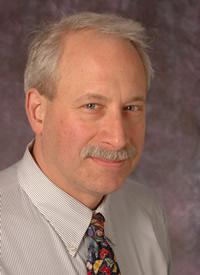
Joel Cantor
Joel Cantor is a Distinguished Professor of Public Policy at the Edward J. Bloustein School of Public Policy and founding Director of the Center for State Health Policy at Rutgers-New Brunswick. Dr. Cantor is a widely published scholar on issues of health equity with a focus on health insurance regulatory policy and innovative health service delivery and policy strategies for the Medicaid program. His current research addresses the contribution of homelessness to healthcare disparities and the potential of supportive housing for mitigating those disparities. He serves frequently as an advisor on health policy matters to the New Jersey state government and is recipient of the Rutgers University President’s award for Research in Service to New Jersey. In 2019, Dr. Cantor was elected to the National Academy of Social Insurance. He earned his doctorate in health policy and management from the Johns Hopkins University, School of Public Health.
-
Ten new cluster hires coordinated across our New Brunswick and Biomedical and Health Sciences campuses will allow Rutgers to initiate a holistic, multi-faceted and interdisciplinary effort to advance both the science and medical treatment of neurodegenerative diseases while also addressing economic, psycho-social, and lifestyle factors that lead to an increased prevalence or severity of these conditions in the diverse racial and ethnic communities that make up the US population. The goal of the Addressing Health Equity in Age-related Disorders (AHEAD) cluster is to advance knowledge of neurodegenerative disorders, develop treatments and technology solutions that help people experience a higher quality of life, and develop a deep understanding of the social, racial and ethnic health disparities associated with the onset and treatments of neurodegenerative disorders to map a path towards health equity. The clusters draws from four departments, three schools, and two institutes across the Rutgers-New Brunswick and Rutgers Biomedical and Health Sciences (RBHS) campuses.
Cluster Champions:
- Brandon Alderman, Associate Professor and Chair, Kinesiology and Health, SAS, Rutgers-New Brunswick
- Charles Roth, Professor and Interim Chair, Biomedical Engineering, SoE, Rutgers-New Brunswick
- Tobias Gerhard, Professor and Director, Institute for Health, Health Care Policy and Aging Research, Director, Center for Pharmacoepidemiology and Treatment Science, and Professor, Ernest Mario School of Pharmacy, RBHS
- Shawna Hudson, Vice Chancellor of Dissemination and Implementation Science, Rutgers Health, Senior Associate Dean for Population Health Research, and Professor, Vice Chair of Research, and Henry Rutgers Chair of Family Medicine and Community Health, RWJMS, RBHS
- Andrew Thomas, Senior Associate Dean, Professor and Chair, Pharmacology, Physiology and Neuroscience, NJMS, RBHS
- Michal Beeri, Professor and Director, Herbert and Jacqueline Krieger Klein Alzheimer’s Research Center, Neurology, RWJMS, RBHS
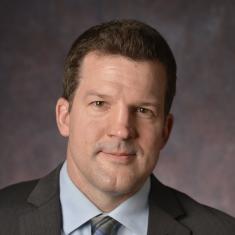
Brandon Alderman
Associate Professor and Chair, Kinesiology and Health, SAS, Rutgers-New Brunswick
Dr. Alderman has established a patient-oriented research program to study how exercise and other behavioral interventions can be used to enhance physiological, neurocognitive and psychological resilience. His research program incorporates psychophysiological and cognitive neuroscience techniques, including event-related potentials (ERPs) and impedance cardiography, to better understand acute and chronic adaptations to exercise, and how knowledge of these adaptations can be applied to intervention development. The ultimate goal is to better understand how exercise and/or physical activity may improve emotional reactivity and cognitive function among at-risk patient populations.
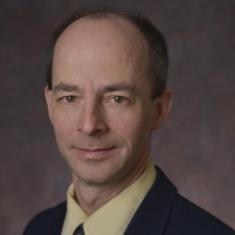
Charles Roth
Professor and Interim Chair, Biomedical Engineering, SoE, Rutgers-New Brunswick
Charles M. Roth is a Professor with joint appointment in the Department of Chemical & Biochemical Engineering and the Department of Biomedical Engineering at Rutgers, The State University of New Jersey. Dr. Roth received his B.S. and Ph.D. degrees in chemical engineering from the University of Pennsylvania and University of Delaware, respectively. Following his Ph.D., he was a postdoctoral associate (1995-1997) at Massachusetts General Hospital and Shriners Burns Hospital, where he continued to work while appointed as Instructor in Surgery and Bioengineering at Harvard Medical School from 1997-2000. In 2000, he moved to Rutgers, where he has established a research program focused on nanomedicine, with an emphasis on delivery of oligonucleotides and peptides. Dr. Roth has co-authored over 60 peer-reviewed journal articles and more than 160 conference presentations, and he holds six issued and one pending patent application. He founded and directed the undergraduate Biomedical Engineering Honors Academy from 2002-2006, served from 2006-2008 as Undergraduate Director for the Department of Biomedical Engineering, and was the founding PI and Director of an NSF-funded REU Site Program in Cellular Bioengineering: From Biomaterials to Stem Cells from 2009-2012, for which he remains a co-PI. Dr. Roth has received a number of major awards including the NSF CAREER, the 2008 Warren L. Susman Award for Excellence in Teaching (University-wide), and the 2015 Engineering Outstanding Faculty Award. Dr. Roth was inducted in 2013 as a Fellow of the American Institute of Medical and Biological Engineering.

Tobias Gerhard
Professor and Director, Institute for Health, Health Care Policy and Aging Research, Director, Center for Pharmacoepidemiology and Treatment Science, and Professor, Ernest Mario School of Pharmacy, RBHS
Tobias Gerhard is a pharmacoepidemiologist and the Founding Director of the Rutgers Center for Pharmacoepidemiology and Treatment Science (PETS). He received his pharmacy degree from the University of Freiburg, Germany (2002), and his PhD in pharmacoepidemiology from the University of Florida (2007). Dr. Gerhard’s work focuses on the development and evaluation of modern pharmacoepidemiologic methods with applications in mental health and geriatric pharmacotherapy. He has extensive experience working with large claims and EHR datasets and has published widely on use, safety, and outcomes of therapeutics, particularly of psychotropic medications in vulnerable populations. His work has been funded by NIA, NIMH, AHRQ, PCORI, and by multiple foundations. Currently, he serves as PI of two R01 awards from the NIA and as subcontract PI for several other NIH-funded projects. His work has been recognized with a NARSAD Young Investigator Award from the Brain and Behavior Research Foundation, a NCDEU New Investigator Award from the American Society of Clinical Psychopharmacology, and the 2020 Sternfels Prize for Drug Safety Discoveries. Dr. Gerhard is a Fellow of the International Society for Pharmacoepidemiology (ISPE) and its current President and serves on committees for FDA and the National Academies of Sciences, Engineering, and Medicine (NASEM). Dr. Gerhard was appointed Acting Director of the Institute for Health, Health Care Policy and Aging Research in December 2021, appointed Interim Director in June 2022, and selected as Director in May 2023.

Shawna Hudson
Vice Chancellor of Dissemination and Implementation Science, Rutgers Health, Senior Associate Dean for Population Health Research, and Professor, Vice Chair of Research, and Henry Rutgers Chair of Family Medicine and Community Health, RWJMS, RBHS
Dr. Shawna Hudson is Vice Chancellor for Dissemination and Implementation Science for Rutgers Health and Senior Associate Dean for Population Health Research at Rutgers Robert Wood Johnson Medical School. She is also founding director of the school’s Center Advancing Research and Evaluation for Patient-Centered Care (CARE-PC). Dr. Hudson is a full research member of the Rutgers Cancer Institute of New Jersey in the Cancer Prevention and Control Program where she previously served as the Director of Community Research and Acting Director of Community Outreach. She has a secondary faculty appointment in the Rutgers School of Public Health in the Department of Health Behavior, Society and Policy. Dr. Hudson currently serves as Director for the Community Engagement Core of the NJ Alliance for Clinical and Translational Science (NJ ACTS) – a Clinical and Translational Science Award (CTSA) consortium of Rutgers University, Princeton University and the New Jersey Institute of Technology. She led its $5 million NIH-funded Rapid Acceleration of Diagnostics for Underserved Populations initiative to improve outreach and access to COVID-19 testing within New Jersey vulnerable and underserved communities.
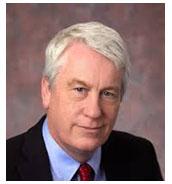
Andrew Thomas
Senior Associate Dean, Professor and Chair, Pharmacology, Physiology and Neuroscience, NJMS, RBHS
Major research interests encompass four distinct areas: 1) studies of the basic mechanisms, regulation and subcellular organization of the IP3-dependent calcium signaling system; 2) mechanisms and function of metabolic sensing and nutrient-derived signals; 3) signaling and drug development targeting blood stage malaria parasites; 4) investigations of excitation-contraction coupling in cardiac muscle cells. In the context of IP3-dependent signaling, my laboratory has played a leading role in the developing recognition of the importance of subcellular organization in calcium signaling. We have extended these studies to investigations of proliferative signaling and the regulation of synchronized development of intraerythrocytic malaria parasites. Current work focuses on the development of therapeutic approaches based
on interfering with the latter signals. We are also investigating mechanisms underlying calcium oscillations and waves, the regulation of IP3-receptor function, and the role of spatially organized calcium signals in the subcellular targeting and tissue integration of calcium-regulated processes. In addition, we study other intracellular calcium release channels, including a ryanodine receptor variant that appears to play an important role in nonexcitable cells. Our studies of the intracellular organization of calcium signaling also examine how cytosolic calcium signals are transmitted to the mitochondrial matrix. This mitochondrial signaling pathway plays a key role in coordinating energy metabolism with cell function. In addition, our studies of mitochondrial function investigate the mechanism and targets of oxidative stress. While our work on calcium signaling is relevant to many physiologic processes, a particular focus of the laboratory is on the role of calcium in the endocrine regulation of metabolism in the brain, liver and peripheral tissues. In addition to the well-known endocrine pathways of metabolic regulation, it is becoming increasingly clear that nutrients and metabolites can also function as signaling molecules in their own right. We refer to these processes as metabolic sensing. We are investigating the signal transduction pathways activated by metabolites in specific neurons of the hypothalamus, as well as liver, muscle and
other tissues. We are also interested in metabolic sensing in cardiac muscle. However, most of our research efforts in the heart focus on cardiomyocyte excitation contraction coupling and how this is modified in response to disease states, including alcoholic cardiomyopathy and ischemic injury. The broad range of research emphasis in my laboratory are linked by the common role of calcium as an intracellular signal and by the similar technical approaches utilized, which range from molecular biology to high-speed digital imaging.
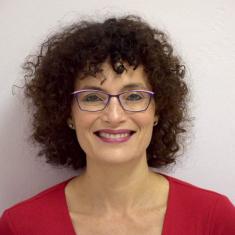
Michal Beeri
Professor and Director, Herbert and Jacqueline Krieger Klein Alzheimer’s Research Center, Neurology, RWJMS, RBHS
Michal Schnaider Beeri, a global leader in Alzheimer’s disease clinical research and director of the Herbert and Jacqueline Krieger Klein Alzheimer’s and Dementia Clinical Research and Treatment Center, as its Endowed Chair in Neurodegenerative Research.
Beeri, who came to Rutgers from Mount Sinai School of Medicine where she was a professor in psychiatry, specializing in geriatric psychology, cognitive impairment and diabetes as a risk factor for neurodegeneration. The recipient of numerous awards from the National Institutes of Health, Beeri has published more than 190 peer-reviewed articles in leading journals and serves on major health and medical editorial boards. She is credited for helping to establish The Joseph Sagol Neuroscience Center at Sheba Medical Center in Israel, which is acclaimed for Alzheimer’s and dementia research. Through her trailblazing research, Beeri has been praised for trying to help prevent Alzheimer’s disease and dementia in the general population.
A professor at Rutgers Robert Wood Johnson Medical School Department of Neurology and a Core Member of the Brain Health Institute, Beeri has spent much of her career mentoring and training both students and post-doctoral scientists. To better understand the causes of Alzheimer’s and dementia and help develop novel therapeutics for its treatment, Beeri is creating cohorts for clinical trials on Alzheimer’s disease and dementia. The knowledge gained from work done at the new center, which opened this fall, will offer hope for both patients and families whose lives have been unequivocally altered by the devastating effects of dementia and Alzheimer’s disease.
-
Evolutionary medicine is an inclusive term that encompasses how evolutionary biology and genetics help us better understand the causes of human illnesses, and how we can leverage evolution to design better, more long-lasting health interventions. An intrinsic part of a more evolutionary and genomic approach to medicine is ensuring health equity and addressing pseudoscientific attempts to racialize medicine in the past. Six new cluster hires will catalyze research and teaching initiatives in the emergent area of personalized medicine and shifting paradigms in how we approach treating human chronic and acute illnesses. The cluster aims to create fundamental and translational discoveries that will shape medicine and public health in the 21st century. The cluster will draw from six departments, four schools, a center, and an institute across the Rutgers-New Brunswick and Rutgers Biomedical and Health Sciences (RBHS) campuses.
Cluster Champions:
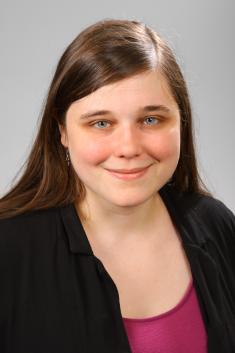
Siobain Duffy
Professor and Chair, Ecology, Evolution, and Natural Resources (DEENR), SEBS, New Brunswick
Siobain Duffy is an evolutionary virologist who studies emerging RNA and ssDNA pathogens -- viruses with small genomes and high mutation rates. Her wet lab uses phage model systems to understand the evolutionary genetics behind shifting onto novel hosts. The computational side of her lab works on a range of organisms, with a focus on epidemic ssDNA plant viruses. She conducted her PhD research at Yale University with Paul Turner and was an NSF postdoctoral fellow with Edward Holmes at Penn State University. Her research has won awards from the American Society for Microbiology and the American Society for Virology, and she has twice been awarded University-wide teaching awards. She is a Professor and Chair of the Department of Ecology, Evolution and Natural Resources at the School of Environmental and Biological Sciences, and co-Editor-in-Chief of Virus Evolution.
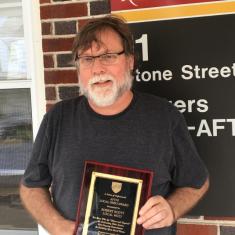
Rob Scott
Associate Professor and Undergraduate Program Director, Anthropology, SAS, New Brunswick
Rob Scott grew up in Hamilton, Montana and received his Ph.D from the University of Texas at Austin in 2004. His research is united by an interest in environmental influences on hominid evolution. Previous work includes a strong quantitative and analytic program in evolutionary morphology and paleoanthropology including museum studies of fossil species, a record of fieldwork as part of international collaborations in Java, Turkey, Hungary, and China, finite element modeling of the human tibia, and extensive work reconstructing ancient environments relevant to the evolution of the human lineage.
Scott is the co-developer of a new repeatable method for quantifying primate and hominid dental microwear in three dimensions. This method has provided new insights into the diet of South African early hominins suggesting the importance of fallback food exploitation and was published in the journal Nature in 2005. Scott has a strong focus on late Miocene hominid paleoenvironments in Western Eurasia and is a leading expert in the application of the ecomorphology of fossil bovids and equids in the reconstruction of ancient environments. More recently, Scott has begun work on Homo erectus in Asia including field study an Ngandong in Java.
At Rutgers, Scott teaches the course “Extinction”, part of the pioneering SAS Signature course initiative [on YouTube]. Scott also teaches “Human Osteology” and “Quantitative Methods in Evolutionary Anthropology.”
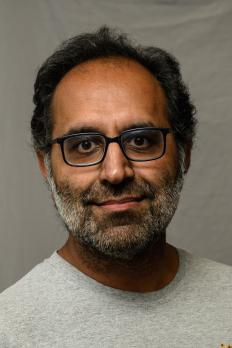
Vik Nanda
Professor, Biochemistry & Molecular Biology, RWJMS, RBHS
Our group is interested in constructing new proteins for applications in biomedical research, nanotechnology and as tools for understanding how proteins fold and evolve. Significant progress has been made in the last decade using sophisticated computer programs to design proteins with novel folds and functions. We maintain and develop software for protein design, structure prediction and docking of protein-ligand complexes. Several design projects our group pursues include the computational design of an extracellular matrix, thermostabilization of peptide therapeutics with D-amino acids and prediction of allergenicity of food proteins.
The extracellular matrix (ECM) is a complex network of collagens, laminins, fibronectins and proteoglycans that provides a surface upon which cells can adhere, differentiate and proliferate. Defects in the ECM are the underlying cause of a wide spectrum of diseases. The ECM mediates endothelial cell polarity and under normal conditions can suppress pre-oncogenic transitions to a neoplastic state. We are constructing artificial, de novo collagen-based matrices using a hierarchic computational approach. These matrices are physically characterized in the laboratory and used to probe the role of chemical and spatial organization in the ECM on the tumor forming potential of adhered cells.
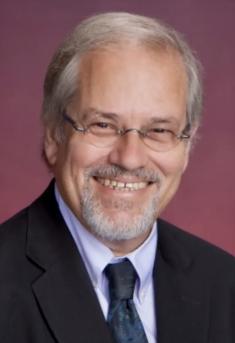
Carlos Pato
Vice President of Research, Training and Academic Affairs & Executive Chair of Psychiatry, RBHS
Carlos Pato, MD, PhD, is Vice President of Research, Training and Academic Affairs for Rutgers University Behavioral Health Care (UBHC) and the Executive Chair of Psychiatry for Rutgers RBHS. Much of Dr. Carlos Pato’s work is related to social determinants of health. His research has focused on genomic psychiatry, with an emphasis on population-based genetic studies. Prior to Dr. Carlos Pato’s experience with the Institute for Genomic Health, he served for three-and-a-half years as senior vice president and dean of the College of Medicine at SUNY Downstate, doubling the number of affiliated hospital beds and affiliated faculty, and developing a focus on primary care, as well as building up research on population health and disparities, with a focus on genomics and social determinants of health. Previously, he served as chair of Psychiatry at the University of Southern California’s Keck School of Medicine, where, under his leadership, the clinical program grew 350 percent, the research program grew from two to 13 NIH-funded investigators and NIH funding grew 10-fold, while philanthropic support grew 15-fold.
A graduate of the University of Cincinnati College of Medicine, Dr. Carlos Pato received an honorary doctorate in medical genetics from Universidade de Coimbra, Portugal, where he has served as a visiting scientist and co-lead of the Unit for Neuropsychiatric Genetics since 1990. He completed his residency training in psychiatry at Massachusetts General Hospital, Boston, and subsequently served as a research fellow at the National Institute of Mental Health, Bethesda, Md.
Dr. Carlos Pato is a distinguished fellow of the American Psychiatric Association and a charter member of the International Society of Psychiatric Genetics and has held leadership positions with the American Association of Chairs of Departments of Psychiatry, among his many professional associations.
A co-editor of Revista Brasileira de Psiguiatria and field editor of the American Journal of Genetics, Dr. Carlos Pato also serves on the editorial board of Translational Psychiatry and as a reviewer for nearly a dozen peer-reviewed professional journals. He has nearly 200 peer-reviewed articles to his credit, as well as publications in other journals, book chapters and a book.
Rutgers Biomedical and Health Sciences
-
Ten new cluster hires coordinated across our New Brunswick and Biomedical and Health Sciences campuses will allow Rutgers to initiate a holistic, multi-faceted and interdisciplinary effort to advance both the science and medical treatment of neurodegenerative diseases while also addressing economic, psycho-social, and lifestyle factors that lead to an increased prevalence or severity of these conditions in the diverse racial and ethnic communities that make up the US population. The goal of the Addressing Health Equity in Age-related Disorders (AHEAD) cluster is to advance knowledge of neurodegenerative disorders, develop treatments and technology solutions that help people experience a higher quality of life, and develop a deep understanding of the social, racial and ethnic health disparities associated with the onset and treatments of neurodegenerative disorders to map a path towards health equity. The clusters draws from four departments, three schools, and two institutes across the Rutgers-New Brunswick and Rutgers Biomedical and Health Sciences (RBHS) campuses.
Cluster Champions:
- Brandon Alderman, Associate Professor and Chair, Kinesiology and Health, SAS, Rutgers-New Brunswick
- Charles Roth, Professor and Interim Chair, Biomedical Engineering, SoE, Rutgers-New Brunswick
- Tobias Gerhard, Professor and Director, Institute for Health, Health Care Policy and Aging Research, Director, Center for Pharmacoepidemiology and Treatment Science, and Professor, Ernest Mario School of Pharmacy, RBHS
- Shawna Hudson, Vice Chancellor of Dissemination and Implementation Science, Rutgers Health, Senior Associate Dean for Population Health Research, and Professor, Vice Chair of Research, and Henry Rutgers Chair of Family Medicine and Community Health, RWJMS, RBHS
- Andrew Thomas, Senior Associate Dean, Professor and Chair, Pharmacology, Physiology and Neuroscience, NJMS, RBHS
- Michal Beeri, Professor and Director, Herbert and Jacqueline Krieger Klein Alzheimer’s Research Center, Neurology, RWJMS, RBHS

Brandon Alderman
Associate Professor and Chair, Kinesiology and Health, SAS, Rutgers-New Brunswick
Dr. Alderman has established a patient-oriented research program to study how exercise and other behavioral interventions can be used to enhance physiological, neurocognitive and psychological resilience. His research program incorporates psychophysiological and cognitive neuroscience techniques, including event-related potentials (ERPs) and impedance cardiography, to better understand acute and chronic adaptations to exercise, and how knowledge of these adaptations can be applied to intervention development. The ultimate goal is to better understand how exercise and/or physical activity may improve emotional reactivity and cognitive function among at-risk patient populations.

Charles Roth
Professor and Interim Chair, Biomedical Engineering, SoE, Rutgers-New Brunswick
Charles M. Roth is a Professor with joint appointment in the Department of Chemical & Biochemical Engineering and the Department of Biomedical Engineering at Rutgers, The State University of New Jersey. Dr. Roth received his B.S. and Ph.D. degrees in chemical engineering from the University of Pennsylvania and University of Delaware, respectively. Following his Ph.D., he was a postdoctoral associate (1995-1997) at Massachusetts General Hospital and Shriners Burns Hospital, where he continued to work while appointed as Instructor in Surgery and Bioengineering at Harvard Medical School from 1997-2000. In 2000, he moved to Rutgers, where he has established a research program focused on nanomedicine, with an emphasis on delivery of oligonucleotides and peptides. Dr. Roth has co-authored over 60 peer-reviewed journal articles and more than 160 conference presentations, and he holds six issued and one pending patent application. He founded and directed the undergraduate Biomedical Engineering Honors Academy from 2002-2006, served from 2006-2008 as Undergraduate Director for the Department of Biomedical Engineering, and was the founding PI and Director of an NSF-funded REU Site Program in Cellular Bioengineering: From Biomaterials to Stem Cells from 2009-2012, for which he remains a co-PI. Dr. Roth has received a number of major awards including the NSF CAREER, the 2008 Warren L. Susman Award for Excellence in Teaching (University-wide), and the 2015 Engineering Outstanding Faculty Award. Dr. Roth was inducted in 2013 as a Fellow of the American Institute of Medical and Biological Engineering.

Tobias Gerhard
Professor and Director, Institute for Health, Health Care Policy and Aging Research, Director, Center for Pharmacoepidemiology and Treatment Science, and Professor, Ernest Mario School of Pharmacy, RBHS
Tobias Gerhard is a pharmacoepidemiologist and the Founding Director of the Rutgers Center for Pharmacoepidemiology and Treatment Science (PETS). He received his pharmacy degree from the University of Freiburg, Germany (2002), and his PhD in pharmacoepidemiology from the University of Florida (2007). Dr. Gerhard’s work focuses on the development and evaluation of modern pharmacoepidemiologic methods with applications in mental health and geriatric pharmacotherapy. He has extensive experience working with large claims and EHR datasets and has published widely on use, safety, and outcomes of therapeutics, particularly of psychotropic medications in vulnerable populations. His work has been funded by NIA, NIMH, AHRQ, PCORI, and by multiple foundations. Currently, he serves as PI of two R01 awards from the NIA and as subcontract PI for several other NIH-funded projects. His work has been recognized with a NARSAD Young Investigator Award from the Brain and Behavior Research Foundation, a NCDEU New Investigator Award from the American Society of Clinical Psychopharmacology, and the 2020 Sternfels Prize for Drug Safety Discoveries. Dr. Gerhard is a Fellow of the International Society for Pharmacoepidemiology (ISPE) and its current President and serves on committees for FDA and the National Academies of Sciences, Engineering, and Medicine (NASEM). Dr. Gerhard was appointed Acting Director of the Institute for Health, Health Care Policy and Aging Research in December 2021, appointed Interim Director in June 2022, and selected as Director in May 2023.

Shawna Hudson
Vice Chancellor of Dissemination and Implementation Science, Rutgers Health, Senior Associate Dean for Population Health Research, and Professor, Vice Chair of Research, and Henry Rutgers Chair of Family Medicine and Community Health, RWJMS, RBHS
Dr. Shawna Hudson is Vice Chancellor for Dissemination and Implementation Science for Rutgers Health and Senior Associate Dean for Population Health Research at Rutgers Robert Wood Johnson Medical School. She is also founding director of the school’s Center Advancing Research and Evaluation for Patient-Centered Care (CARE-PC). Dr. Hudson is a full research member of the Rutgers Cancer Institute of New Jersey in the Cancer Prevention and Control Program where she previously served as the Director of Community Research and Acting Director of Community Outreach. She has a secondary faculty appointment in the Rutgers School of Public Health in the Department of Health Behavior, Society and Policy. Dr. Hudson currently serves as Director for the Community Engagement Core of the NJ Alliance for Clinical and Translational Science (NJ ACTS) – a Clinical and Translational Science Award (CTSA) consortium of Rutgers University, Princeton University and the New Jersey Institute of Technology. She led its $5 million NIH-funded Rapid Acceleration of Diagnostics for Underserved Populations initiative to improve outreach and access to COVID-19 testing within New Jersey vulnerable and underserved communities.

Andrew Thomas
Senior Associate Dean, Professor and Chair, Pharmacology, Physiology and Neuroscience, NJMS, RBHS
Major research interests encompass four distinct areas: 1) studies of the basic mechanisms, regulation and subcellular organization of the IP3-dependent calcium signaling system; 2) mechanisms and function of metabolic sensing and nutrient-derived signals; 3) signaling and drug development targeting blood stage malaria parasites; 4) investigations of excitation-contraction coupling in cardiac muscle cells. In the context of IP3-dependent signaling, my laboratory has played a leading role in the developing recognition of the importance of subcellular organization in calcium signaling. We have extended these studies to investigations of proliferative signaling and the regulation of synchronized development of intraerythrocytic malaria parasites. Current work focuses on the development of therapeutic approaches based
on interfering with the latter signals. We are also investigating mechanisms underlying calcium oscillations and waves, the regulation of IP3-receptor function, and the role of spatially organized calcium signals in the subcellular targeting and tissue integration of calcium-regulated processes. In addition, we study other intracellular calcium release channels, including a ryanodine receptor variant that appears to play an important role in nonexcitable cells. Our studies of the intracellular organization of calcium signaling also examine how cytosolic calcium signals are transmitted to the mitochondrial matrix. This mitochondrial signaling pathway plays a key role in coordinating energy metabolism with cell function. In addition, our studies of mitochondrial function investigate the mechanism and targets of oxidative stress. While our work on calcium signaling is relevant to many physiologic processes, a particular focus of the laboratory is on the role of calcium in the endocrine regulation of metabolism in the brain, liver and peripheral tissues. In addition to the well-known endocrine pathways of metabolic regulation, it is becoming increasingly clear that nutrients and metabolites can also function as signaling molecules in their own right. We refer to these processes as metabolic sensing. We are investigating the signal transduction pathways activated by metabolites in specific neurons of the hypothalamus, as well as liver, muscle and
other tissues. We are also interested in metabolic sensing in cardiac muscle. However, most of our research efforts in the heart focus on cardiomyocyte excitation contraction coupling and how this is modified in response to disease states, including alcoholic cardiomyopathy and ischemic injury. The broad range of research emphasis in my laboratory are linked by the common role of calcium as an intracellular signal and by the similar technical approaches utilized, which range from molecular biology to high-speed digital imaging.

Michal Beeri
Professor and Director, Herbert and Jacqueline Krieger Klein Alzheimer’s Research Center, Neurology, RWJMS, RBHS
Michal Schnaider Beeri, a global leader in Alzheimer’s disease clinical research and director of the Herbert and Jacqueline Krieger Klein Alzheimer’s and Dementia Clinical Research and Treatment Center, as its Endowed Chair in Neurodegenerative Research.
Beeri, who came to Rutgers from Mount Sinai School of Medicine where she was a professor in psychiatry, specializing in geriatric psychology, cognitive impairment and diabetes as a risk factor for neurodegeneration. The recipient of numerous awards from the National Institutes of Health, Beeri has published more than 190 peer-reviewed articles in leading journals and serves on major health and medical editorial boards. She is credited for helping to establish The Joseph Sagol Neuroscience Center at Sheba Medical Center in Israel, which is acclaimed for Alzheimer’s and dementia research. Through her trailblazing research, Beeri has been praised for trying to help prevent Alzheimer’s disease and dementia in the general population.
A professor at Rutgers Robert Wood Johnson Medical School Department of Neurology and a Core Member of the Brain Health Institute, Beeri has spent much of her career mentoring and training both students and post-doctoral scientists. To better understand the causes of Alzheimer’s and dementia and help develop novel therapeutics for its treatment, Beeri is creating cohorts for clinical trials on Alzheimer’s disease and dementia. The knowledge gained from work done at the new center, which opened this fall, will offer hope for both patients and families whose lives have been unequivocally altered by the devastating effects of dementia and Alzheimer’s disease.
-
Evolutionary medicine is an inclusive term that encompasses how evolutionary biology and genetics help us better understand the causes of human illnesses, and how we can leverage evolution to design better, more long-lasting health interventions. An intrinsic part of a more evolutionary and genomic approach to medicine is ensuring health equity and addressing pseudoscientific attempts to racialize medicine in the past. Six new cluster hires will catalyze research and teaching initiatives in the emergent area of personalized medicine and shifting paradigms in how we approach treating human chronic and acute illnesses. The cluster aims to create fundamental and translational discoveries that will shape medicine and public health in the 21st century. The cluster will draw from six departments, four schools, a center, and an institute across the Rutgers-New Brunswick and Rutgers Biomedical and Health Sciences (RBHS) campuses.
Cluster Champions:

Siobain Duffy
Professor and Chair, Ecology, Evolution, and Natural Resources (DEENR), SEBS, New Brunswick
Siobain Duffy is an evolutionary virologist who studies emerging RNA and ssDNA pathogens -- viruses with small genomes and high mutation rates. Her wet lab uses phage model systems to understand the evolutionary genetics behind shifting onto novel hosts. The computational side of her lab works on a range of organisms, with a focus on epidemic ssDNA plant viruses. She conducted her PhD research at Yale University with Paul Turner and was an NSF postdoctoral fellow with Edward Holmes at Penn State University. Her research has won awards from the American Society for Microbiology and the American Society for Virology, and she has twice been awarded University-wide teaching awards. She is a Professor and Chair of the Department of Ecology, Evolution and Natural Resources at the School of Environmental and Biological Sciences, and co-Editor-in-Chief of Virus Evolution.

Rob Scott
Associate Professor and Undergraduate Program Director, Anthropology, SAS, New Brunswick
Rob Scott grew up in Hamilton, Montana and received his Ph.D from the University of Texas at Austin in 2004. His research is united by an interest in environmental influences on hominid evolution. Previous work includes a strong quantitative and analytic program in evolutionary morphology and paleoanthropology including museum studies of fossil species, a record of fieldwork as part of international collaborations in Java, Turkey, Hungary, and China, finite element modeling of the human tibia, and extensive work reconstructing ancient environments relevant to the evolution of the human lineage.
Scott is the co-developer of a new repeatable method for quantifying primate and hominid dental microwear in three dimensions. This method has provided new insights into the diet of South African early hominins suggesting the importance of fallback food exploitation and was published in the journal Nature in 2005. Scott has a strong focus on late Miocene hominid paleoenvironments in Western Eurasia and is a leading expert in the application of the ecomorphology of fossil bovids and equids in the reconstruction of ancient environments. More recently, Scott has begun work on Homo erectus in Asia including field study an Ngandong in Java.
At Rutgers, Scott teaches the course “Extinction”, part of the pioneering SAS Signature course initiative [on YouTube]. Scott also teaches “Human Osteology” and “Quantitative Methods in Evolutionary Anthropology.”

Vik Nanda
Professor, Biochemistry & Molecular Biology, RWJMS, RBHS
Our group is interested in constructing new proteins for applications in biomedical research, nanotechnology and as tools for understanding how proteins fold and evolve. Significant progress has been made in the last decade using sophisticated computer programs to design proteins with novel folds and functions. We maintain and develop software for protein design, structure prediction and docking of protein-ligand complexes. Several design projects our group pursues include the computational design of an extracellular matrix, thermostabilization of peptide therapeutics with D-amino acids and prediction of allergenicity of food proteins.
The extracellular matrix (ECM) is a complex network of collagens, laminins, fibronectins and proteoglycans that provides a surface upon which cells can adhere, differentiate and proliferate. Defects in the ECM are the underlying cause of a wide spectrum of diseases. The ECM mediates endothelial cell polarity and under normal conditions can suppress pre-oncogenic transitions to a neoplastic state. We are constructing artificial, de novo collagen-based matrices using a hierarchic computational approach. These matrices are physically characterized in the laboratory and used to probe the role of chemical and spatial organization in the ECM on the tumor forming potential of adhered cells.

Carlos Pato
Vice President of Research, Training and Academic Affairs & Executive Chair of Psychiatry, RBHS
Carlos Pato, MD, PhD, is Vice President of Research, Training and Academic Affairs for Rutgers University Behavioral Health Care (UBHC) and the Executive Chair of Psychiatry for Rutgers RBHS. Much of Dr. Carlos Pato’s work is related to social determinants of health. His research has focused on genomic psychiatry, with an emphasis on population-based genetic studies. Prior to Dr. Carlos Pato’s experience with the Institute for Genomic Health, he served for three-and-a-half years as senior vice president and dean of the College of Medicine at SUNY Downstate, doubling the number of affiliated hospital beds and affiliated faculty, and developing a focus on primary care, as well as building up research on population health and disparities, with a focus on genomics and social determinants of health. Previously, he served as chair of Psychiatry at the University of Southern California’s Keck School of Medicine, where, under his leadership, the clinical program grew 350 percent, the research program grew from two to 13 NIH-funded investigators and NIH funding grew 10-fold, while philanthropic support grew 15-fold.
A graduate of the University of Cincinnati College of Medicine, Dr. Carlos Pato received an honorary doctorate in medical genetics from Universidade de Coimbra, Portugal, where he has served as a visiting scientist and co-lead of the Unit for Neuropsychiatric Genetics since 1990. He completed his residency training in psychiatry at Massachusetts General Hospital, Boston, and subsequently served as a research fellow at the National Institute of Mental Health, Bethesda, Md.
Dr. Carlos Pato is a distinguished fellow of the American Psychiatric Association and a charter member of the International Society of Psychiatric Genetics and has held leadership positions with the American Association of Chairs of Departments of Psychiatry, among his many professional associations.
A co-editor of Revista Brasileira de Psiguiatria and field editor of the American Journal of Genetics, Dr. Carlos Pato also serves on the editorial board of Translational Psychiatry and as a reviewer for nearly a dozen peer-reviewed professional journals. He has nearly 200 peer-reviewed articles to his credit, as well as publications in other journals, book chapters and a book.
Newark
-
The goal of this cluster is to accelerate the growth of Rutgers University-Newark as a regional and national center of excellence in Latinx Studies. The Identities, Injustice, and Power in the Latinx Diaspora Cluster will recruit five new faculty members to conduct innovative social science research on the ways that power has been, and continues to be, used against and used by Latinx communities to reshape their identities, their access to power and resources, and the landscapes in which they live. Priority will be given to hiring social scientists who use quantitative, qualitative (e.g., ethnographic), and digital methods to examine: 1. Past and present relations between Black Atlantic, South Asian, and indigenous communities throughout the Caribbean and the Americas and the ways that contact between these communities have informed Latinx ethnoracial identities and inter and intragroup relations across the diaspora; 2. International policy, (neo)colonialism, environmental injustice and their impacts on (im)migration and forced displacement in the Latinx diaspora; 3. Structural inequalities (e.g., structural racism, linguistic inequality) and their implications for the psychosocial, educational, health, and economic welfare of diasporic Latinx youth and adults; and 4. Factors influencing Latinx political and sociopolitical development (e.g., political attitudes, political identities, voting behaviors) and the implications of these developments for the reshaping of global electoral politics. The cluster will draw from four departments in the School of Arts & Sciences-Newark: Political Science, Sociology and Anthropology, Urban Education, and American Studies.
Cluster Hires:
- Anthony Ureña, Sociology and Anthropology, Assistant Professor, Rutgers-Newark
- Melanie Plasencia, Sociology and Anthropology, Assistant Professor, Rutgers-Newark
- Erica Salinas Thomas, Political Science, Assistant Professor, Rutgers-Newark
- Sandy Placido, History, Assistant Professor, Rutgers-Newark
- Natalie Muñoz, Social Work, Assistant Professor, Rutgers-Newark
Cluster Champion:
Jennifer Austin, Professor, Spanish and Portuguese Studies, Rutgers-Newark
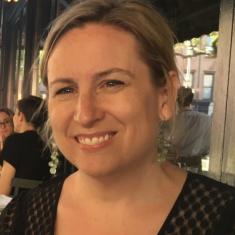
Jennifer Austin
Jennifer Austin is a Professor of Spanish and Portuguese Studies at Rutgers-Newark. Her research and teaching interests include language acquisition and multilingualism as well as Hispanic and Basque linguistics. Austin is a member of the graduate faculty in Psychology and in Global Urban Studies at Rutgers-Newark as well as in Spanish and Portuguese at Rutgers-New Brunswick. She is also a co-founder of HoLa, a dual-language charter school in Hoboken, NJ, and a co-founder and the faculty advisor of the Lives in Translation Project at Rutgers-Newark.
-
Five new cluster hires will build capacity in students’ ability to use data-driven methods to address complex problems in the sciences, building upon and supporting the exponential growth of the SASN minor in Data Science. The initiative aims to attract scientists from diverse backgrounds who address complex problems using advanced statistical techniques (e.g., clustering techniques, network analysis), machine learning, predictive analytics, and causal modeling. The cluster intends both to strengthen and diversify the advanced curriculum in data sciences available to students and to serve as a crucible for engaging students in mentored research with faculty. Priority will be given to scholars who have demonstrated that they can effectively teach courses in their discipline as well as courses that fit broadly under the rubrics of applied data science, applied statistics, and or applied computational science; and scholars who have demonstrated a commitment to mentoring undergraduate students. All STEM departments will be eligible to participate in this cluster hire initiative.
Cluster Champion:
Kristina Keating, Associate Professor, Earth and Environmental Sciences, Rutgers-Newark
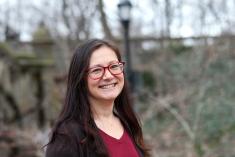
Kristina Keating
Kristina Keating is an Associate Professor of near-surface geophysics in the Department of Earth and Environmental Sciences at Rutgers University-Newark. Her research focuses on laboratory and field based geophysical measurements to understand processes occurring in the top 100 m’s of Earth’s surface. Her research spans critical zone science, hydrogeophysics, cryosphere geophysics, biogeophysics, and soil science. She is also actively involved in science education research to engage students from groups historically underrepresented in the geosciences.
Camden
-
Health equity is central to the interdisciplinary field of Prevention Sciences, which “focuses on the development of evidence-based strategies that reduce risk factors and enhance protective factors to improve the health and wellbeing of individuals, families, and communities” (National Prevention Science Coalition). Since the most challenging social and structural problems influencing health outcomes and quality of life rarely fit within the confines of traditional disciplines, Prevention Science is also inherently interdisciplinary. Rutgers University-Camden will recruit four new cluster faculty to advance a range of research collaborations across six different programs in three schools on the Camden Campus: Health Sciences, Psychology, Childhood Studies, and Criminal Justice (all within the Camden College of Arts and Sciences); the School of Nursing-Camden; and the School of Business-Camden. These collaborations will serve as foundations for research and teaching in Prevention Sciences and will support the launch of a forthcoming interdisciplinary research center and new graduate program.
Cluster Hires:
- Valerie Adams-Bass, Assistant Professor, Childhood Studies, Rutgers-Camden
- Lisa Lewis, Professor, Nursing, Rutgers-Camden
- Yoona Kang, Assistant Professor, Health Sciences, Rutgers-Camden
- Sujoy Chakravarty, Assistant Professor, Psychology, Rutgers-Camden
Cluster Champion:
Kristin August, Associate Professor, Department of Psychology and Health Sciences Center, Rutgers-Camden
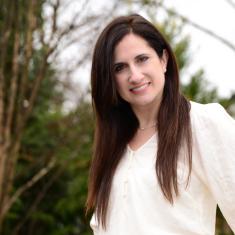
Kristin August
Kristin August is an Associate Professor of Psychology and Core Faculty Member of the Health Sciences Center at Rutgers University - Camden.
Her main research focus is on the link between personal relationships and health in diverse populations, such as individuals with chronic illness, older adults, racial/ethnic minorities, sexual minorities, and individuals with disabilities.
She teaches courses in health psychology, psychology of aging, health sciences, and research methods.
-
Sustainability addresses how human beings interact with their habitat and each other in the process of finding, procuring, and utilizing the planet’s resources. This cluster hire is a collaborative enterprise and will culminate in the development of a multidisciplinary Sustainability cluster whose mission is to identify and characterize connections between economic, industrial, and environmental systems while synthesizing new methods and materials to foster equity in environmental impacts and outcomes across all community types within New Jersey and beyond. Four new hires will be made across all ranks in the Department of Chemistry, (FASC), the Department of Mathematical Sciences (FASC), the Department of Physics (FASC), and the School of Business.
Cluster Hires:
Cluster Champion:
Lead Cluster Champion:
Sean M. O’Malley, Associate Professor and Chair, Department of Physics, FASC
Co-Champions:
Siqi Fu, Professor, and Chair, Department of Mathematical Sciences, FASC; Catherine Grgicak, Associate Professor and Chair, Department of Chemistry, FASC, and Richard A. Michelfelder, Associate Professor of Professional Practice, Finance, School of Business, Rutgers-Camden
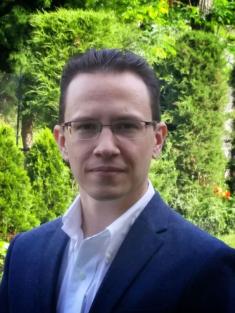
Sean M. O’Malley
Sean M. O’Malley, Associate Professor, and Chair, Department of Physics, FASC. His research interests include the synthesis of nanoparticles via the Pulsed Laser Ablation in Liquids (PLAL) method, thin-film deposition using Matrix Assisted Pulsed Laser Evaporation (MAPLE), photovoltaic and piezoelectric activity in novel material systems, and the interaction between plasmonically excited metal nanoparticles with their surroundings.

Siqi Fu
Siqi Fu is a Professor and Chair of the Department of Mathematical Sciences at Rutgers University-Camden. The main focus of his research is the spectral theory of partial differential operators and geometric analysis of several complex variables. Dr. Fu is particularly interested in the interplay between spectral behavior of the complex Laplace operator and geometric structures of the underlying space. He is also fascinated by the connection between mathematics and music. His research is supported in part by grants from the National Science Foundation. Dr. Fu obtained his Ph.D. degree in Mathematics from Washington University in St. Louis. He was a recipient of an American Mathematical Society Centennial Research Fellowship in 2000.
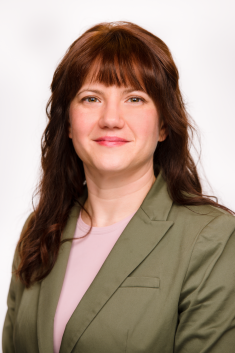
Catherine Grgicak
Catherine Grgicak (Gerg-i-chuck) is an Associate Professor, Henry Rutgers Chair, and Department Chair of the Department of Chemistry at Rutgers University in Camden NJ. She received her B.S. in Physical Science and B.Ed. from the University of Windsor, her M.S.F.S. from the University of Alabama at Birmingham, and her Ph.D. in Chemistry from the University of Ottawa. Her Laboratory for Forensic Technology and Integration is focused on developing systems and procedures that improve forensically relevant bio-analytical processes. She is a member of the Journal of Forensic Science’s editorial board, the editorial board of Electrophoresis, Forensic Laboratory Needs Technical Working Group, Expert Working Group on Human Factors in DNA Interpretation, American Society of Forensic Sciences, the International Society of Forensic Genetics and the Center for Computational and Integrative Biology at Rutgers University.
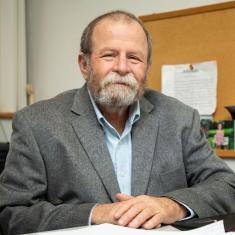
Richard A. Michelfelder
Richard A. Michelfelder, Ph.D. is an Associate Professor of Professional Practice, Finance, at the School of Business – Camden. His research and advisement to energy and water/wastewater utilities globally focus on sustainability in energy and water. At Rutgers, he has been awarded many research grants and teaching awards, including the President’s Excellence Award. Previously, Dr. Michelfelder was CEO and Board Chairperson of Quantum Consulting, Inc., a national public utility consulting firm, and Quantum Energy Services and Technologies, LLC., an energy and water efficiency services company based in Berkeley, California. He has testified many times before state regulatory agencies and the Federal Energy Regulatory Commissions on issues related to the cost of capital, energy efficiency, water load research, cost of service, and incentive rate mechanisms for energy efficiency. He has published numerous articles specifically addressing public utilities and climate change. He holds the Ph.D. in economics from Fordham University.